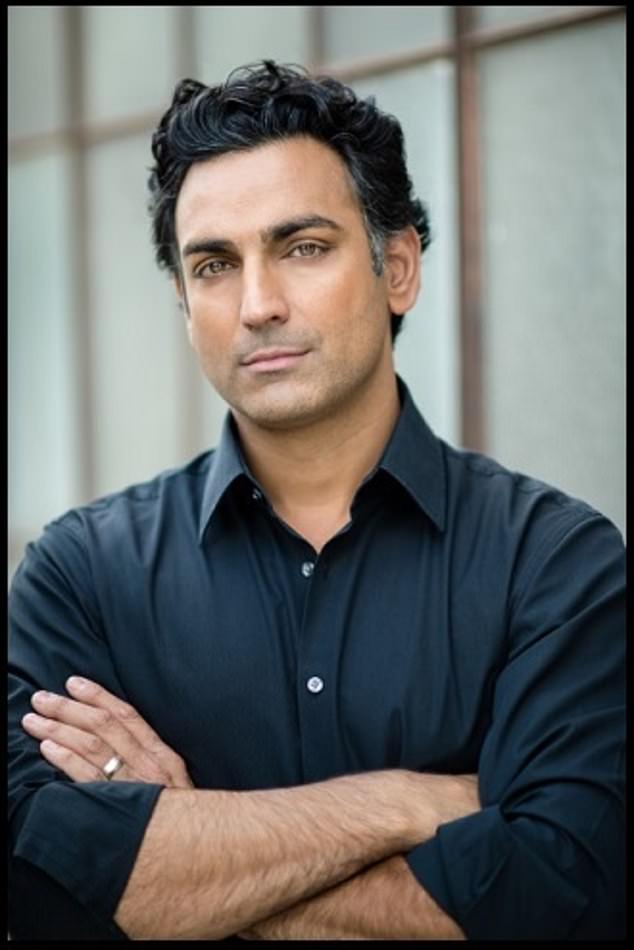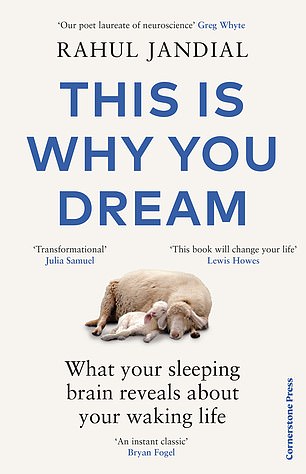Have you ever woken up completely scared after an erotic dream?
About eight in 10 people dream at some point about having sex with people they don’t even find attractive, often friends and colleagues.
It can trigger an overwhelming feeling of guilt in some cases: if the dream involved a friend’s partner, for example, or if the dreamer was cheating on their spouse.
For others, it can be deeply confusing: it is not uncommon for heterosexual people to have erotic dreams about someone of the same sex.
Now, a new book has tried to explain why we dream about certain people and reassure people that sexual dreams are not always the result of our subconscious desires.
Dreamers often imagine someone they know, even if they are extremely common or unattractive (file image)
Neuroscientist Dr. Rahul Jandial says that there are generally two types of sexual dreams and their causes are completely different.
A sexual dream involving someone you are attracted to and regularly fantasize about while awake can often manifest in our dreams.
But the other type of sexual dream involves seemingly random people, even if the dreamer doesn’t like them or finds them unattractive.
All dreams are a product of our brain’s Imagination Network, free from the rules and logic of our waking life.
When we dream, the imagination is free and free to find loose associations and connections in our memories.
It can lead us to think about the people in our lives in surprising, disturbing, and even erotic ways.
Because the logical Executive Network in our brain shuts down during dreams, we can’t stop these erotic flights of fantasy before they take off. They are also free from judgment, even our own.
In erotic dreams we feel freed to imagine sexual encounters that would be taboo or inconceivable in our waking life.
They probably won’t involve our current partner. Instead, we are much more inclined toward bisexuality and novel sexual interactions in general.
Dr. Jandial says, “This moderating influence on our erotic imagination when we are awake disappears when we dream, allowing our erotic dreams to be wildly creative and exploratory.”
That same moderating influence becoming dormant allows us to dream of flying at high altitudes or breathing underwater, or any number of creative scenarios.
Dr. Jandial adds: “If our daytime fantasies are visions of some desired, albeit improbable, sexual outcome, erotic dreams are more like a prurient thought experiment.”
“We can change gender or become bisexual in our dreams, even if it never crosses our mind during the day or in our most liberated fantasy.”

Neuroscientist Dr. Rahul Jandial posits that sexual dreams are a benign product of limitless imagination and not something to be ashamed of.

Dr. Jandial’s new book explains why we dream about certain people and ensures that erotic dreams are not always the result of subconscious sexual desires
And whether a person experiences a sexual dream has little to do with their level of sexual activity in waking life, how much porn they watch, or how much they masturbate.
The best predictor of sexual dreams is the frequency with which a person daydreams or fantasizes about sex.
Dr. Jandial says: “If our erotic imagination is more active when we are awake, it is quite possible that we become more open to erotic dreams at night.”.’
It may be surprising to know that the mind does not usually evoke the ideal sexual partner to star in erotic dreams; it rarely includes the ideal partner. Most of the time, the dreamer personally knows the star of her erotic dream.
Dreamers often imagine someone closer to home, someone extremely ordinary, unattractive, or even repellent.
This is why sexual dreams usually involve ex-partners, ex-bosses, co-workers, friends, neighbors and even family members, and often take place in familiar environments.
Scientists posit that sexual dreams have a basis in evolution, preparing early humans (and animals) to adapt to the unexpected, such as the sudden death of a partner.
As Dr. Jandial says: “This may help explain why erotic dreams tend not to look outside ‘the tribe’ but stay close to home.”
The important role that familiarity plays in the conception of erotic dreams could also explain the number of times one might fantasize about Halle Berry, Ryan Gosling, Jennifer Anniston, or any number of attractive celebrities.
Dr. Rodrigo Quian Quiroga, from the University of Leicester in England, determined that celebrities are deeply ingrained in our brains at a cellular level and become as familiar to us as our own grandmother.
Dr. Quiroga connected thin, wire-like electrodes inserted into the cerebral cortices of people’s brains to see how individual neurons activated and found that specific neurons responded to images of celebrities.
In one patient, a single neuron responded to a photo of Halle Berry and ignored photos of other people. He responded to photos of her on the red carpet, in costume, even with just her name written on it.
In another patient, Dr. Quiroga saw a specific neuron activate in response to seeing pictures of Jennifer Anniston and ignoring pictures of other people, animals, and buildings.
Dr. Jandial writes: Celebrities have literally taken root in our neural architecture. Our response to them suggests that they are as familiar to us as an old friend or neighbor.’
The star of the erotic dream, whether a former lover or a supervisor at work, is less important than what the dream symbolizes.
For example, a flirtation with your boss in a dream may have less to do with how attractive you find him or her and more to do with a desire to exert more power at work or a recognition of your own career ambitions.
Dr. Jandial says: ‘In this way, erotic dreams are more than our true desires: they are the embodiment of desire itself.
“Erotic dreams prepare us for sexual exploration… This makes sense if we remember that the essential biological imperative of life is to survive at least long enough to procreate.”


